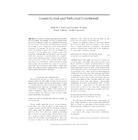Counterfactual and Prefactual Conditionals
Citation
Egan, S. & Byrne, R. (2004). 'Counterfactual and Prefactual Conditionals'. Canadian Journal of Experimental Psychology, 58(2), 113-120.
Egan, S. & Byrne, R. (2004). 'Counterfactual and Prefactual Conditionals'. Canadian Journal of Experimental Psychology, 58(2), 113-120.
Abstract
We consider reasoning about prefactual possibilities
in the future, for example, “if I were to win the lottery
next year I would buy a yacht” and counterfactual possibilities,
for example, “if I had won the lottery last year, I would
have bought a yacht.” People may reason about indicative
conditionals, for example, “if I won the lottery I bought a
yacht” by keeping in mind a few true possibilities, for
example, “I won the lottery and I bought a yacht.” They
understand counterfactuals by keeping in mind two possibilities,
the conjecture, “I won the lottery and I bought a
yacht” and the presupposed facts, “I did not win the lottery
and I did not buy a yacht.” We report the results of three
experiments on prefactuals that examine what people judge
them to imply, the possibilities they judge to be consistent
with them, and the inferences they judge to follow from
them. The results show that reasoners keep a single possibility
in mind to understand a prefactual.
Keywords
MICLanguage (ISO 639-3)
engPublisher
Canadian Journal of Experimental PsychologySponsor(s)
Enterprise IrelandIrish Research Council for Humanities and Social Sciences


